Soybeans, Corn Fall on Improved US Crop Rating; Wheat Down for Third Session
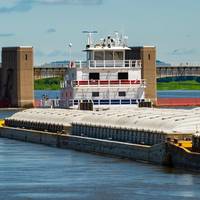
Chicago corn and soybean futures slid on Tuesday after a weekly report from the U.S. government showed better-than-expected conditions for both crops.Wheat fell for a third consecutive session on increasing estimates for Russia’s production and exports.The most-active soybean contract on the Chicago Board of Trade (CBOT) lost 0.2% to $13.23-3/4 a bushel, as of 0401 GMT, and corn fell 0.7% to $4.84-1/2 a bushel. Wheat gave up 0.2% to $6.15 a bushel.Weekly condition ratings for the U.S. soybean and corn crops improved in the past week more than analysts expected, U.S.
Can Ukraine's Grain Corridor Ease the Global Food Crisis?
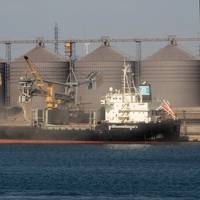
Russia has proposed that a U.N.-backed initiative that has enabled grains to be exported from Ukraine's Black Sea ports should be renewed for just 60 days.The deal to free up grain exports from Ukraine's southern Black Sea ports, which expires later this month, has previously been renewed for 120 days and there are concerns a shorter extension could cause logistical issues.Reached in July last year, it created a protected sea transit corridor and was designed to alleviate global food shortages by allowing exports to resume from three ports in Ukraine…
Talks Underway on Black Sea Grain Deal Extension in Geneva
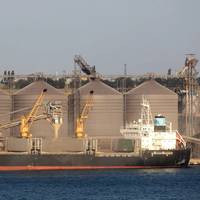
Negotiations began on Monday between U.N. officials and Russian Deputy Foreign Minister Sergei Vershinin on a possible extension to a deal allowing the safe export of grain from Ukraine's Black Sea ports, the Russian diplomatic mission in Geneva said.The Black Sea grain initiative, brokered between Russia and Ukraine by the United Nations and Turkey last July, aimed to prevent a global food crisis by allowing Ukrainian grain blockaded by Russia's invasion to be safely exported from three Ukrainian ports.The deal…
Can Ukraine's Grain Deal Ease the Global Food Crisis?
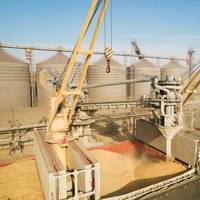
A deal to free-up vital grain exports from Ukraine expires on Nov. 19, and intense negotiations over the next few days will determine whether it is extended and possibly even expanded to help ease concerns about global food security.The agreement, reached in July, created a protected sea transit corridor and was designed to alleviate global food shortages by allowing exports to resume from three ports in Ukraine, a major producer of grains and oil seeds.Here are some of the issues:WHAT HAS BEEN EXPORTED?The pact created a safe shipping channel for exports from three ports in Ukraine.So far…
USDA Raises Corn Harvest View, Cuts Soy Production Outlook
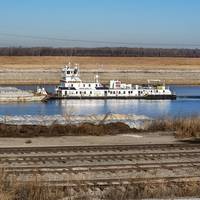
Smaller-than-expected soybean harvests in the major production states of Indiana, Iowa, Kansas and Ohio sparked a surprise cut to the U.S. harvest outlook, the government said on Tuesday.But U.S. corn production will be bigger than previously projected as farmers recorded their biggest yield ever, according to the U.S. Agriculture Department's monthly World Agricultural Supply and Demand Estimates report. Expectations for rising production estimates had put pressure on soy and corn prices heading into the report.
Cargo Ship Collides with Dock in Rosario
A cargo ship collided with a dock on the Parana River in Argentina's grains hub of Rosario on Wednesday, causing a slowdown of activity at terminal 6 in the port of General San Martín and raising soymeal prices."The southern pier of terminal 6 is operational, with difficulties on the barge docks due to the blockage caused by the ship that generated the accident," said Guillermo Wade, manager of Argentina's Chamber of Port and Maritime Activity."The north dock of terminal 6 suffered some serious damage. One operator working in the area suffered a minor blow, but nothing serious," Wade said.Argentina is the world's top exporter of soymeal livestock feed and the third biggest supplier of raw soybeans.The ship…
Flooding Cripples Grain Barge Shipments in U.S. Midwest
Grain barge shipping came to a near standstill in parts of the U.S. Midwest on Thursday as recent heavy rain and melting snow swelled rivers, halted barge loading and sidelined the towboats that haul farm belt crops to Gulf Coast export terminals. The flooded waterways sent cash premiums for corn barges delivered to Gulf Coast terminals soaring. Rates hit peaks on Thursday that have not been seen in 18 months, as exporters scrambled to secure enough grain to top off vessels bound for overseas markets, traders said. Barge lines suspended operations on northern sections of the Illinois River, with water levels already near record crests, or forecast to reach those levels by the weekend, according to National Weather Service river forecasts.
CME Lifts 'Force Majeure' at Some Illinois River Locales
The CME Group Inc on Thursday said it lifted the majority of force majeure conditions invoked at corn and soybean shipping stations on the Illinois River earlier this month. Force majeure conditions continue to exist at some exchange-approved corn and soybean shipping stations, which may prevent these facilities from loading, the CME said. Corn and soybean futures are traded on the CME's Chicago Board of Trade. On May 4, the CME declared force majeure due to load-out impossibility at a majority of the exchange-approved regular facilities on the Illinois River due to high water levels and flooding. Reporting by Apeksha Nair
Is Container Freight Now a Commodity?
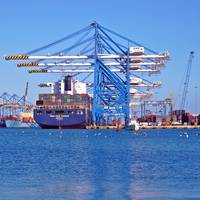
In an interview with Patrik Berglund, the Xeneta CEO says that the introduction of the "commodity" status for the container would benefit both shippers and carriers. Q- In today’s world of Amazon, Alibaba and E-commerce, have container rates (meaning 20-40’dry box) reached ’commodity’ status? Not exactly. There is a major difference between ‘cheap’ and being a ‘commodity.’ Clearly the current rates are very low, and in fact threatening the financial viability of 4-6 ocean carriers, but business cycles, as set by supply and demand, are part of the global economic cycle.
Euronext Says Working on Black Sea Wheat Futures
The rising influence of Black Sea markets on world prices prompted Euronext to start working on developing futures contract that would allow price hedging in one of the world's largest export zones for the grain, it said on Friday. Production swings in the Black Sea and European Union have become the main drivers of world wheat prices to the detriment of Chicago futures as U.S. farmers increasingly turned to corn and soybean crops, analysts and traders said. "Having assessed the long-standing need for a proper price-setting mechanism in that production zone, we are now engaged in a serious reflection about a careful design," Euronext head of commodities Olivier Raevel told Reuters at the Cereals Europe conference in Geneva.
US Corn, Wheat Supplies to Rise as Exports Wane
U.S. corn and wheat ending stocks will be higher than previously expected at the end of the marketing year due to cuts to already weak demand for U.S. supplies on the export market, the government said on Tuesday. The U.S. Agriculture Department in its monthly supply and demand report also raised its soybean ending stocks outlook due to a slowdown in the pace of crushing at domestic processors. The new domestic supply view for all three commodities came in above the average of analysts' estimates, near the high end of market forecasts. On the global front, wheat ending stocks were raised above the high end of trade expectations, largely due to a 4.0-million tonne cut to usage by China, reflecting that country's policy shift that favors other grains.
CME Lifts Force Majeure for all Illinois River Grain Terminals
CME Group has lifted its declaration of force majeure at all Illinois River terminals that are regular for Chicago Board of Trade corn and soybean futures delivery, the exchange said in a notice on Tuesday. CME declared force majeure on June 17 due to high water and flooding that made it impossible for the terminals, which are delivery points for CBOT corn and soy futures, to load grain. The exchange lifted force majeure at a majority of stations on July 22 as river levels dropped. All terminals are now able to load out, CME said. Reporting by Julie Ingwersen
Force Majeure Lifted for Most Illinois River Grain Terminals
CME Group on Thursday said force majeure was no longer in effect at a majority of Illinois River terminals that are regular for Chicago Board of Trade corn and soybean futures delivery. However, the exchange said force majeure conditions due to high water and flooding persisted at some delivery points that might prevent those facilities from loading. At those locations, under CBOT rules, shippers must arrange for grain to be loaded at another regular facility not under force majeure. (Reporting by Julie Ingwersen; Editing by Meredith Mazzilli)
Brazilian Corn Cargos Bound for Southeastern US
Cargill Inc next week is likely to load 50,000 tonnes of Brazilian corn bound for the United States, shipping data showed on Wednesday, in what is expected to be the first of several bulk vessels of South American grain that will be imported here this year. Hog and poultry producers in the Southeastern United States purchased two vessels of corn from South America for arrival in August and September while at least one other vessel was likely to arrive by March, three U.S. corn export traders said. Cargill was the listed shipper for the Nord Voyager vessel, which was due to load the 50,000 tonnes of corn at the Brazilian port of Santarem, according to Williams Shipping Agency data. A spokesman for Cargill, which has a port terminal in Santarem, declined to comment.
CME: Force Majeure for Shipping Stations Due to Floods
CME declares force majeure for corn, soy shipping stations due to floods CME Group Inc declared force majeure for all corn and soybean shipping stations because of flooding on the Illinois River, according to a notice from the exchange operator on Wednesday. A majority of facilities on the river, which are delivery points for crops traded on CME's Chicago Board of Trade, are unable to load crops due to high water levels, the notice said. (Reporting by Tom Polansek; Editing by Marguerita Choy)
Some Roads Reopened in Brazil, Truck Strike Persists
Striking truckers lifted their blockade of dozens of highways in Brazil after police began fining and arresting protesters, though strike organizers said they had no plans to end their stoppage now in its 10th day. Road blockages were reported at 59 locations across six states on Friday down from the Thursday count of 88 road blocks, according to the latest report from highway police. Most protesting drivers rejected an initial government offer and negotiations were not scheduled to resume until March 10. Even so, a spokesman for Paranagua port said 514 soy trucks had arrived on Friday, up from 255 trucks at the same time on Thursday. Brazil is the world's No. 2 soy producer and a top global supplier.
Illinois River Lock Closure May Spur CME Grain Contract Tweaks
An upcoming river lock repair project in south Chicago has attracted the attention of exchange operator CME Group because the lock's closure could disrupt deliveries against its Chicago Board of Trade grain and soybean futures contracts. The U.S. Army Corps of Engineers will close the 64-year-old T.J. O'Brien lock and dam on the Cal-Sag Channel for two phases of repairs beginning on Nov. 3 and again on Jan. 19. It is the northernmost of eight locks on the Illinois Waterway system, near the entrance to Lake Michigan. Each closure will halt traffic there for 47 days and could make it more difficult or costly for buyers of futures contracts to take delivery of grain housed in Chicago since the lock lies within the contracts' delivery zone 1.
Brazilian Soybeans Reach US, More En Route
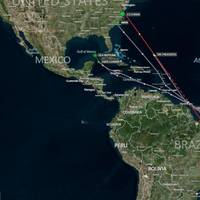
Two bulk shipments of Brazilian soybeans arrived at the U.S. ports of Wilmington, North Carolina, and Norfolk, Virginia, over the weekend, the first large South American shipments to hit the U.S. East Coast this season, Reuters shipping data showed. They were the latest shipments since two cargoes arrived at the U.S. Gulf Coast early last month, starting the country's biggest wave of soy imports in history, with about 2 million tonnes expected to reach U.S. shores over the next two months.
Barge Shipments of Brazil Soy Bound for US Midwest Crushers
Deep discounts for Brazilian soybeans are creating an unexpected new market with U.S. processors and animal producers far upstream in the heart of the Midwest farm belt where the beans will be shipped on barges. While light soybean imports by U.S. users along the Gulf and East Coast are not uncommon, it has been nearly two decades since South American supplies were unloaded at the Louisiana Gulf and towed up the Mississippi River to inland processors. The current trend reverses the usual flow of barge traffic and sees ports around New Orleans which usually load ocean-going ships with beans switching to unloading arrivals onto barges.
USCG Restricts Barge Tow Size In Mississippi
The U.S. Coast Guard further restricted the size of barge tows on the Mississippi River due to problems with low water levels that have caused several groundings in recent weeks, Reuters reported. It said, effective immediately, barge tows traveling from Cairo, Illinois, to St. Louis, Missouri, were limited to no more than 15 barges, loaded or unloaded, due to continued low water levels. Two weeks prior the Coast Guard established a 180-mile long safety zone on the Mississippi River between the two cities after several tows hit ground due to the very low water levels on the river in and near St. Louis. Those restrictions limited the draft of barges to nine feet and the size of north-bound tows to 30 barges with a maximum of 15 loaded. South-bound tows were limited to 20 barges total.
Ukraine Crisis Pushes up Gold, Oil, Grains
Gold, crude oil and grains surged on Monday while industrial metals slid as investors reacted to escalating tensions between Moscow and Kiev after the Russian military tightened its grip on Ukraine's Crimea region. Concern about supplies pushed up crude oil prices by more than $2 a barrel and wheat and corn by 4-6 percent. Safe-haven buying sent gold prices to four-month highs. Base metals such as copper fell along with shares as investors ditched higher-risk assets and due to worries that a conflict could damage global growth. "Trade sanctions and a general ratcheting up of global tensions could also endanger the fragile global economic recovery now under way, hurting commodity prices in the process," analyst Edward Meir at broker INTL FCStone said.







